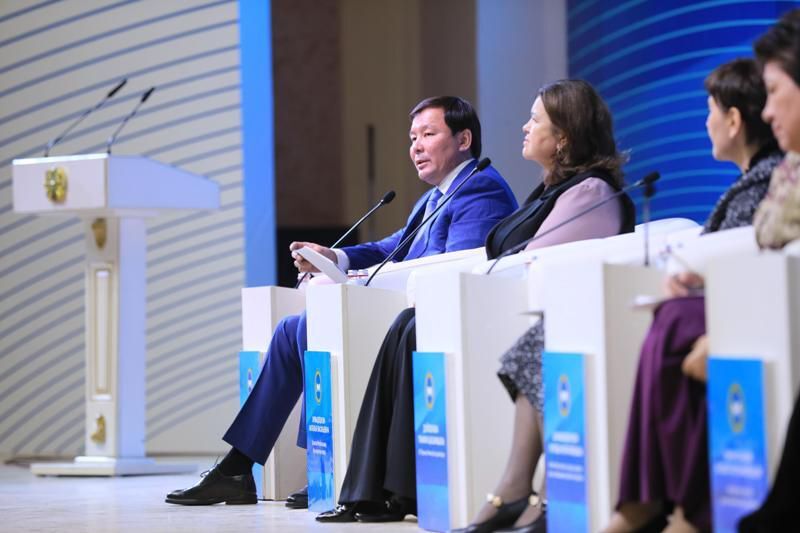Implementation of the pilot project “Development of the Potential of Small Rural Schools Using Digital Technologies” in Aktobe region started last year.
A republican seminar on results of this project has been held in Aktobe today. The Deputy Prime Minister of Kazakhstan, Tamara Duissenova, Akim of Aktobe region, Askhat Shakharov, Deputy Chief Executive Officer of Kazakhstan Khalkyna fund, Lyazzat Chinkisbayeva, and Chairman of the Board of Trustees of the Foundation for Sustainable Development of Education, Honored Teacher of Kazakhstan, Kulyash Shamshidinova, have attended it.

Speaking as a moderator of the seminar, the head of the region, Askhat Shakharov, noted the high efficiency of the project.
“Head of State Kassym-Jomart Tokayev has always supported the education sector and set specific tasks that give impetus to its development. This seminar is one of the important steps aimed at bringing the education system of Kazakhstan to a new level in accordance with Instructions of the President. The project “Development of the Potential of Small Rural Schools Using Digital Technologies” implemented last year in Aktobe region has improved the quality of education and the effectiveness of training. Compared to 2023, the quality of education in rural schools has increased by an average of 7%. A digital ecosystem of education has been formed in the region.
I express my gratitude to all citizens who worked on an unprecedented project implemented for the first time in the country to support small rural schools,” Akim of the region said.

In her speech, Deputy Prime Minister, Tamara Duissenova, highly appreciated results of the pilot project and noted that it needs to be implemented in other regions.
“This project is very important for us. 67 percent of the country’s schools are located in rural areas. More than half of them are small schools. It is necessary to expand the project. First of all, it should be implemented in regions with a large number of small schools. Our main goal is to give all children a high-quality education,” Tamara Duissenova said.
The regional Akimat, relevant ministry, the Fund for Sustainable Development of Education and Kazakhstan Khalkyna fund participated in implementation of the project during the year.
As a result, 113 of 134 schools participating in the project were equipped with universal classrooms, the rest with science classrooms and digital classrooms. Kazakhstan Khalkyna fund has allocated financial resources. Four digital learning formats have been tested in these schools. Educational institutions have established links with hub schools in the district centers. Teachers have also used digital solutions for streaming education.
As a result, 113 of 134 schools participating in the project were equipped with universal classrooms, the rest with science classrooms and digital classrooms. Kazakhstan Khalkyna fund has allocated financial resources. Four digital learning formats have been tested in these schools. Educational institutions have established links with hub schools in the district centers. Teachers have also used digital solutions for streaming education.

As a result, the monitoring held by FSDE and Nazarbayev Intellectual Schools at the beginning and end of the academic year showed an improvement in the quality of knowledge in almost all disciplines. In addition, small schools that were directly connected to the hub schools and where the teachers of hub schools conducted the training showed higher results as compared to other forms of education. The problem of Internet accessibility and speed was also positively solved in 77.4% of schools during implementation of the project.
In addition, the pilot project showed that in small schools it is possible to solve the problem of shortage of teaching staff. To do this, it is necessary to establish close ties with hub schools and strengthen work with digital platforms. At the same time, it is worth noting the work of the local education department. The Regional Methodological Center not only coordinated the schedule of classes between schools, but also supervised more than 12 thousand online lessons, and maintained feedback with teachers.
In addition, the pilot project showed that in small schools it is possible to solve the problem of shortage of teaching staff. To do this, it is necessary to establish close ties with hub schools and strengthen work with digital platforms. At the same time, it is worth noting the work of the local education department. The Regional Methodological Center not only coordinated the schedule of classes between schools, but also supervised more than 12 thousand online lessons, and maintained feedback with teachers.

“Aktobe region is the first region in the country where the comprehensive work of hub and magnetic schools has been fully implemented. The result of our project has shown that the shortage of high-quality personnel in remote regions can be solved using digital technologies and teachers of hub schools,” Daniyar Toktarbayev, Director of the Fund for Sustainable Development of Education, said.
It should be noted that as part of the pilot project, methodological recommendations, analytical materials, and amendments to legislative acts were proposed.
Project partners present at the seminar expressed their willingness to further share the methods of organizing and implementing the project with other regions.
Project partners present at the seminar expressed their willingness to further share the methods of organizing and implementing the project with other regions.
